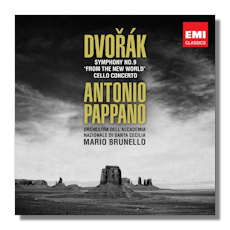
The Internet's Premier Classical Music Source
Related Links
- Dvořák Reviews
- Latest Reviews
- More Reviews
-
By Composer
-
Collections
DVD & Blu-ray
Books
Concert Reviews
Articles/Interviews
Software
Audio
Search Amazon
Recommended Links
Site News
 CD Review
CD Review
Antonín Dvořák

- Symphony #9 in E Minor, Op. 95 "From the New World"
- Cello Concerto in B minor, Op. 104
Mario Brunello, cello
Orchestra dell'Accademia Nazionale di Santa Cecilia - Roma/Antonio Pappano
EMI Classics 914102-2 DDD 2CDs 86:35
Hyped as a "marriage made in heaven", Antonio Pappano ushered his Orchestra dell'Accademia Nazionale di Santa Cecilia in Rome out of obscurity into the international spotlight. Guided since 2005 by the busy maestro – who combines his Roman post with that of music director of the Royal Opera House, Covent Garden – Santa Cecilia embarked upon a series of tours, recording at the same time for EMI Classics popular symphonic works from Tchaikovsky, Rachmaninoff, Respighi and Mahler, as well as operas from Rossini and Puccini. Their most recent release bravely pairs two Antonín Dvořák's warhorses, the 9th Symphony "From the New World" and the Cello Concerto, taped live and assembled from a handful of concerts in Rome in 2011/12.
By the sound of it, Pappano desperately wants to make a point with his orchestra. Yet the competition is formidable. In Dvořák's "From the New World" incisive strings, sturdy brass and hard-hitting timpani succeed each other in a relentless, rather demonstrative manner. Gestures are broad and often dramatic, images are painted with an almost nonchalant brush and a sense of urgency drives it all forward. Yet other than the plain obvious – can anyone miss the melancholy of the famous Largo? – there is very little here that can survive comparisons with luminaries like Talich, Ancerl, Kubelik, Smetacek, Kertesz, Fricsay, among others. Least of all Santa Cecilia which for all its zest and fire doesn't offer a particularly distinguished sonority and no matter how great the marriage with Pappano may be, their Dvořák boasts as much affinity with Czech spirit as Natalie Portman with ballet.
Moreover, all good intentions are betrayed by an extremely messy recording. As in olden Soviet times, it sounds as if every musician, including Pappano, had a microphone placed right under the nose. The sound picture is crackling with background noises, less from the audience than from orchestra members, shuffling, breathing, and above all maestro Pappano blowing and hissing cues every few seconds. One may call it his operatic side and in concert it may all be very exciting to behold. On disc, however, it grows old and irritating very fast, especially during the quieter passages. There are some downright ludicrous moments, as in the final Allegro con fuoco when the cymbal scraping sounds like another sigh from maestro. And as if we still weren't aware this was recorded live, the Italian EMI engineers made sure to paste a burst of enthusiastic applause almost on top of the final fading chord.
Soloist in the Cello Concerto is the relatively unknown Italian Mario Brunello, joint winner of the Moscow International Tchaikovsky Competition in 1986. His reading certainly displays imagination as well as passion, and he connects well with Pappano, yet his tendency to magnify accents and phrases quickly becomes distracting. It adds to the overall sense of affectation that characterizes these concerts and stands in total opposition to the naturalness and authentic sweep of the already mentioned references. While not as disastrous as the symphony, this recording won't set new standards of bringing the experience of a live concert to our living rooms either and Brunello seems captured within the orchestral mass. As with the symphony, one can safely stick with the old favorites – Starker/Doráti, Piatigorsky/Munch, Fournier/Szell, Casals/Szell…. After all, there is plenty of choice.
Copyright © 2013, Marc Haegeman





















